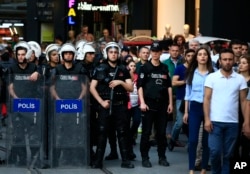Turkish lawmakers on Friday voted by the required two-thirds majority to pass a constitutional amendment that removes immunity for 138 deputies facing criminal investigation.
Turkish President Recep Tayyip Erdogan, the driving force behind the measure, welcomed the vote, describing it as historic. He has been calling for the prosecution of members of the pro-Kurdish Peoples' Democratic Party, or HDP.
Political columnist Kadri Gursel of Turkey’s Cumhuriyet newspaper and Al-Monitor website, said the vote would strengthen the president's support among Turkish nationalists, whom he is courting for an expected referendum on the extension of presidential powers.
"First aim is to flirt with the nationalist constituency," Gursel said. "And, in case of any referendum, he [Erdogan] will use it, by saying that we sent them [Kurdish deputies] away from parliament, these unarmed terrorists."
50 face probes
Fifty out of 59 HDP deputies face more than 400 criminal investigations, many of which are under the country’s anti-terror law. Supporters of the amendment claimed public confidence in parliament was being undermined because of the deputies' support of Kurdish rebels of the PKK.
Observers say most of the investigations involve speeches advocating greater Kurdish rights, rather than any connection to violence.
Political consultant Atilla Yesilada of Global Source Partners said the courts would act swiftly once the constitutional amendment comes into force.
"The courts will start immediately, arresting HDP deputies," Yesilada said. "The PKK already has threatened all-out war. HDP might completely withdraw from the parliament, and all the experts say pretty much the same thing: that [it] would be the end of Kurds' hopes of reaching parity with Turks, and we could see street protests."
Four jailed in 1994
This would not be the first prosecution of pro-Kurdish deputies. In 1994, four were jailed for a decade under anti-terror laws. That was followed by escalation in fighting by the PKK.
Gursel said history could be on verge of repeating itself.
"Once again, Turks will be showing the Kurds [that they] are forbidden to play the game of democracy," he said. "It will fuel armed struggle. It will legitimize armed struggle, definitely."
Some experts say opponents of the amendment could still challenge its validity in the constitutional court. But if that move fails, the Turkish parliament could well again witness its deputies being taken away by police in handcuffs.
If more than 20 deputies are jailed, that could open the door to parliamentary by-elections. Observers say that would offer the president an opportunity to secure more parliamentary deputies and the chance to secure enough votes to achieve his goal of changing the constitution to extend his presidential powers.





